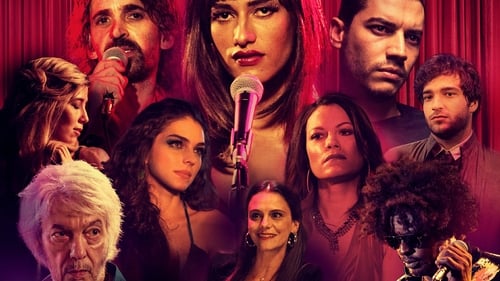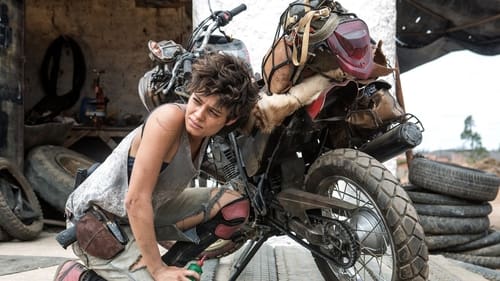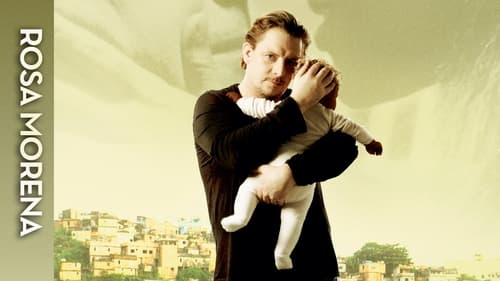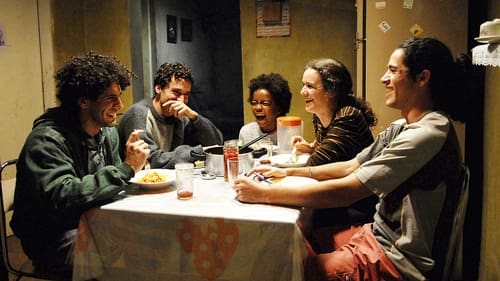
Production Manager
An archaeologist and a weapons designer, who knew each other in a previous life as a filmmaker and a psychoanalyst, meet at an excavation site in the Negev desert and begin a conversation about love and war, which they continue in the Israeli city of Be’er Sheva. A series of encounters with alternating actors in different roles ensues, which leads the viewer through the cities of Athens, Berlin, Hong Kong and São Paulo. Among those appearing are: an old artist who meets his younger self; a mother who lives with her two grown-up sons, a priest and a policeman; a Chinese and a Japanese woman; a curator and a cosmologist.

Art Direction
Dispossessed in an essay about the daily bread. In a country like Brasil, of such abyssal social inequality as there is here, it's urgent for me in cinema to talk about the class to which I belong, the class-who-lives-on-labor. And, alongside that, about the labor relations, the survival, the unemployment, the increasingly impoverished life, the small popular uprisings and the confrontations with the non natural order of things. In "Bread and People", we deal with ruins. And in the struggle of the old against the new, we face mainly the ruin of an idea of progress, and the debris of a critical anti capitalist art today. We've deepened our investigation of an epic, historical and dialectical cinema, using the materials of inspiration themselves.

Costume Design
An elegant dinner, which takes place in real time, brings together a group of intellectuals in the early 90s in São Paulo, Brazil: the hosts are the editor of the country's top news magazine and her husband, the company's lawyer, and the occasion is the wedding anniversary of the magazine publisher and his wife, a famous theater actress. The publisher has written an open letter to the president of the country, with serious denunciations, which will run in the upcoming issue. He risks being arrested this very evening. As tensions increase with the imminence of prison, secrets come to light revealing the conflict between the ethics sought in public life and the ethics practiced in private life.

Costume Design
Marked by losses and mismatches, José's eccentric family seek to be happy while locked in Paraíso Perdido, a nightclub that has stopped in time, where they sing popular romantic music.

Costume Design
Brazil 1821. Upon his return to the imposing farmhouse, Antonio, a rich cattle herder, finds out that his wife dies in labor. Forced to live in the property with numerous African slaves, he marries his wife's niece. A restless soul, he returns to droving, leaving his young wife behind alone with the slaves.

Costume Design
People who moved from São Paulo, a large city, to the countryside, come back to see a play. Later, they learn the driver of their chartered bus has disappeared. Now, on the street, at night, they have to face themselves.

Costume Design
In an arid and poor region of Brazil, bikers search for a miracle to make it rain and save the land, risking their lives.

Costume Design
Thomas, a Danish gay man, is unable to adopt in his home country. He visits a friend in Brazil to explore the possibility of bringing home a child. Eventually he meets Maria, a poor woman who is willing to give away the child she is carrying in exchange for money. As he waits for the child, Thomas takes care of Maria, and their relationship develops in a way he did not expect

Costume Design
Based on the life of Roberto Carlos Ramos, a Brazilian teacher and storyteller brought up in a state educational institution for poor children.

Costume Design
In the periphery of São Paulo, the pregnant single mother Cleuza works as maid in the apartment of a middle-class family. Each of her sons has a different unknown father: the oldest, Dênis, has a baby son that lives with his mother and he works as motorcycle courier.

Costume Design
Silmara, an industrial worker and a woman of exuberant beauty, supports her arsonist father and gets involved with two different pop stars, from whom she learns traumatic life lessons.

Costumer
Cafundó is a 35 mm color film which blends fact with fiction in the life of João de Camargo, a former black slave (1858-1942, Sorocaba, Brazil) who, in his old age, works miracles and devotes himself to assisting others in order to attain his freedom. João de Camargo represents the genesis of religious and cultural syncretism in Brazil.

Costumer
When a doctor decides to carry out an AIDS prevention program inside Latin America’s largest prison: the Casa de Detenção de São Paulo - Carandiru, he discovers the victim of one of the darkest days in Brazilian History when the State of São Paulo’s Military Police, with the excuse for law enforcement, shot to death 111 people. Based on real facts and on the book written by Dráuzio Varella.












